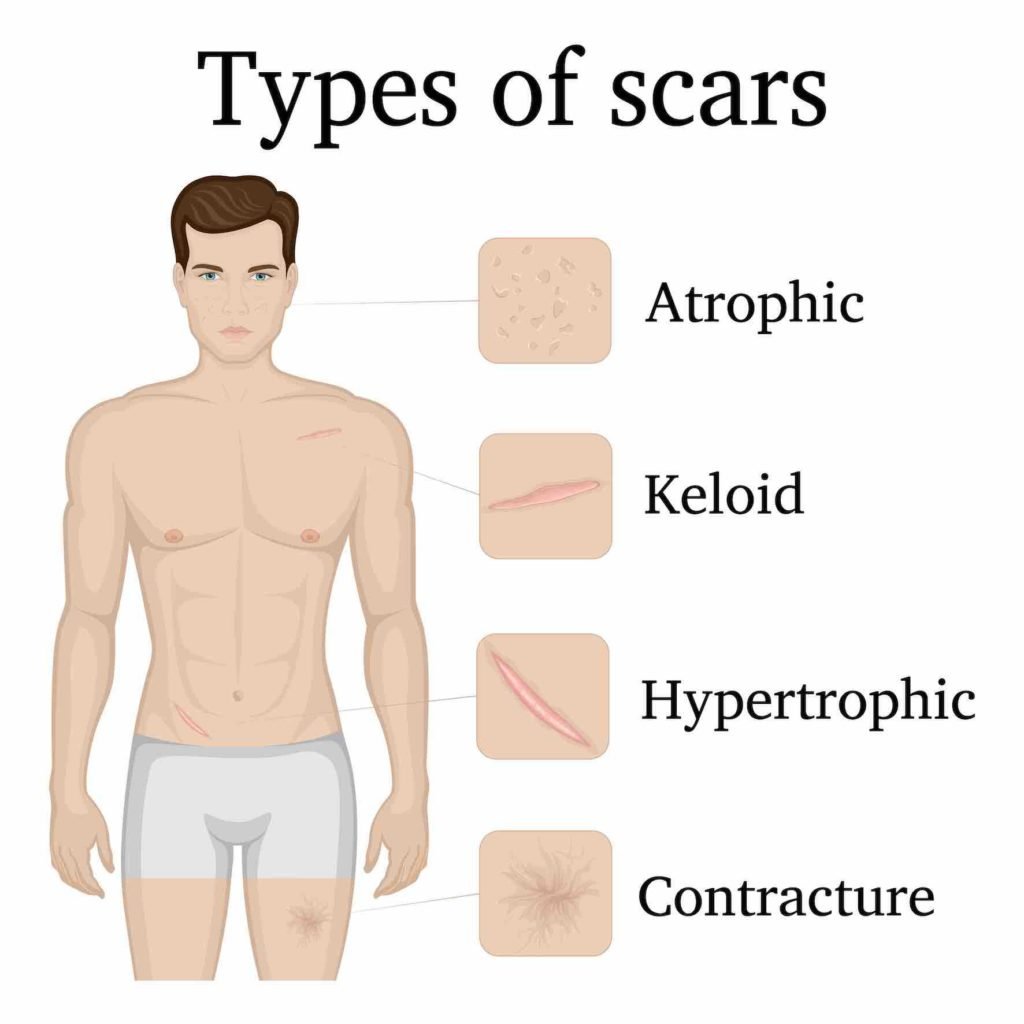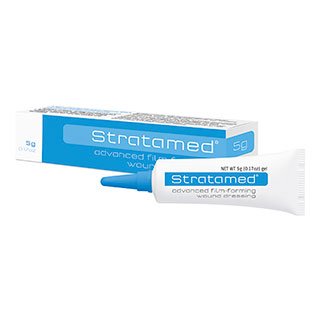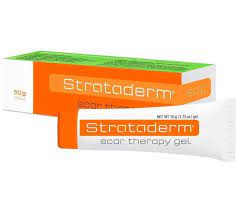Wound care for scar management is incredibly important after plastic surgery. Why? For one, it can help improve the appearance of your scars and make them more comfortable to live with. However, there are other factors as well; without proper treatment, you may end up with longer or more pronounced scars than expected. The goal of this post is to explore these aspects in detail so you know what to expect before and after surgery.
Wound Healing: How Do Scars Heal?
Did you know that the healing process of a surgical wound can take as long as six months to two years? This is why it’s so important to manage your scars well after surgery. You can expect a cosmetic surgery scar to be red and raised for the first few months after surgery. It may also itch or tingle while it heals. After some time, the skin around the incision line starts to soften and flatten out as new tissue grows beneath it. This process usually takes about two years for the complete healing of an incision wound.
Scars are a natural part of the healing process. Unfortunately, they don’t always heal as well as we would like them to. Scars left on your body from plastic surgery can be especially tough because not only do they take longer to heal than other types of scars, but there are also many ways in which you can aggravate them and make them worse. Here are some tips for caring for your plastic surgery scars so that you minimise any scarring or irritation and maximise their appearance:
How to Care For Cosmetic Surgery Scars

To care for your plastic surgery scars, you must have patience. Proper scar management is important because it can help prevent the development of a keloid or hypertrophic scar. It may be tempting to pick at your scabs, but this slows down the healing process and makes things worse! In addition to taking good care of scars in general, here are some other tips:
- Don’t wear tight clothing that rubs against the area
- Avoid any activity that could cause friction on the wound site
- Don’t scratch itchy areas as this will lead to more abrasions
- Keep an eye out for signs of infection such as redness, heat or pus around the wound site.
- Use a sunscreen (SPF 30 +) or zinc cream when outdoors.
All these tips provide some guidelines on how to care for the soft tissue and surrounding skin of post-operative scars.
How to Improve the Appearance of Plastic Surgery Scars
You may have a scar or two on your body that you would like to get rid of. Or you may be planning for surgery, and want to be prepared. There are many options available to improve the appearance of scars after plastic surgery. But how do you know what is best for you?
The type and location of your scar will determine which treatment option is right for you. Scars can be raised, red, rough, thickened and irregular in shape – these all make them more difficult to treat. For instance, if the scar has been there for more than 12 months it’s going to be harder to reduce its prominence than if it had just occurred within the past few weeks. Massage, silicone gels and revisional surgery are all options to reduce the appearance of raised scars.
Silicone for Scar Treatment After Cosmetic Surgery
Silicone sheets were developed to help patients recover faster by reducing inflammation while providing support and protection. A silicone sheet is an adhesive film made from medical grade silicone that acts like a protective layer over your skin. Silicone gels work just as well as traditional silicone sheets but they are much easier to use.
Studies show that silicone can be an optimal treatment for plastic surgery scars. The study was done on patients who underwent breast reduction surgery and found that the majority of patients had a noticeable improvement in their appearance, pain levels, and quality of life after using silicone treatments.
Benefits of Silicone Scar Treatment
There are many benefits associated with silicone gels including:
- Fast healing times
- No need for bandages
- Reduced scarring
- Simple application process.
Dr Doyle‘s recommended products for this method of scar treatment includes Stratamed and Strataderm gel.
Stratamed Silicone Gel

Stratamed is the latest innovation in the treatment of plastic surgery scars. It’s made from a plant extract that helps to heal scar tissue caused by wounds or surgeries, and it can be used before or after an operation.
“Stratamed Gel is a topical product for post-surgical scars that contains natural ingredients such as Shea Butter, Vitamin E and Allantoin.” -Mueller Medical
It can be used on open and deep wounds immediately after surgery. It provides:
- Protection and hydration of the wound, and
- Allows scar management to begin immediately post procedures
After several successful clinical trials, Stratamed has proven to be high in efficacy and ease of use. It has been proven to improve the appearance of scars by up to 50%.
Stratamed can be used in the treatment of any type of scar, including hypertrophic scars and keloids. The gel is applied twice a day for two weeks with no downtime required after application, making it an excellent option for those who are looking for a quick recovery time without having to risk surgery or other invasive procedures.
Strataderm Silicone Gel

Strataderm gel is a topical medication that can help improve the appearance of scars from surgery. It contains two active ingredients, silicone and glycerin, which are designed to work together to give you a more even skin tone and an improved scar texture.
This is a popular treatment following plastic surgery procedures like liposuction, breast augmentation, facelift, tummy tuck (Abdominoplasty), etc.
Strataderm gel eases your pain and speeds up the healing process by reducing inflammation and redness, as well as protecting against infection. Strataderm is beneficial for both new and old scars, but usage should begin once the wound has closed.
DermaLac Lotion
If you’re looking for a way to help reduce the appearance of scars, Environ Derma-Lac lotion is a product worth considering. Environ Derma-Lac lotion is made with natural ingredients and helps to promote skin recovery by supporting collagen production. It contains Alpha Hydroxy Acids in an easily absorbed formula which helps to deeply moisturise and soften uneven skin texture revealing a radiant, well-moisturised complexion.
It works well on most types of scars including acne scars, surgical wounds and other injuries that can leave behind marks like stretch marks. Derma Lac Lotion not only reduces the appearance of those pesky scars but also moisturises as well as soothes irritated skin!
LED Light Therapy
Led light is a treatment that has been shown to have some benefits in reducing the appearance of scars and may lead to more rapid healing.
Led light therapy is a form of treatment typically reserved for treating plastic surgery scars. It’s a TGA-cleared medical device that uses LED lights and delivers them through a mask or other applicator with specific wavelengths of light directed at the skin surface. This process helps stimulate collagen production, which reduces pigmentation within scar tissue and speeds up cell turnover time.
Light therapy, using Red LED lights, has been shown to improve both the aesthetic and functional quality of scar tissue while also reducing pain from itching or burning sensations.
Massage Therapy to Treat Post-Surgery Scars
Deep wounds can result in scars that are both unsightly and uncomfortable. But with the right care, you can help your scar heal to have a smoother appearance. There are many treatment options for scars, such as silicone sheets, light therapy or surgery, but there is one way you can take care of your scars without any professional intervention: massage therapy.
Massage has been proven to increase blood flow to the area by stimulating it and breaking up adhesions within the tissue, which helps reduce swelling and improve circulation. It also stimulates collagen production so that scar tissue will be stronger and less likely to shrink after healing.
When to Massage Your Scar
It is recommended that you start massaging your scar as soon as it has healed. Moisturise twice a day for up to 10 minutes each time until the wound has matured into a pale, flat or soft appearance.
Wear Your Compression Garment
Your compression garment aids in managing post-operative swelling and fluid retention by increasing blood circulation and nutrients to the surgical area. It assists in decreasing discomfort, bruising, and pressure on the incisions which can help reduce visible scars.
Skin Needling
When you are looking for an aesthetic procedure to reduce the appearance of your plastic surgery scars, skin needling might be a good option. Skin needling delivers tiny punctures into the skin which can stimulate collagen production, leading to smoother, more even-toned skin over time. The treatment works on scars from previous surgeries but also acne scarring and stretch marks too.
Skin needling has been shown to reduce the visibility of surgical scars by up to 71% when compared with untreated areas after just four treatments. That percentage reduces further with additional sessions.
Scar Revision Surgery
Scar revision surgery is often performed by a plastic surgeon. The best candidates for scar revision are those who have tried other treatments without success. They must also have realistic expectations about what will change with the procedure.
Frequently Asked Questions About Surgery Scars – Scar Treatment FAQs
What is the best way to reduce scarring after surgery?
- Gently massage the area
- Use silicone gel as a wound dressing (or underneath one)
- Avoid direct sunlight
- Avoid putting stress on your wound
- Take the advice of your surgeon and avoid the gym
- Avoid smoking cigarettes and drinking alcohol during the healing process
Can you reduce scar tissue after surgery?
Cosmetic companies have developed many products to help reduce the appearance of scar tissue after surgery. Gels, silicone sheets and related items might be enough for even skin colour and improve texture in a minor surgical scar.
How long does it take for plastic surgery scars to fade?
In general, it takes about six months for incisions to fully heal and begin to fade from pink to more of a white hue, but it may take between 1 – 2 years for the scars to fully fade.
What does Dr Doyle recommend for scars?
Dr Doyle recommends using a smooth silicone-based gel, such as Stratamed or Strataderm over your incisions. Silicone is the best ingredient, proven by science, to treat the appearance of scars.
How do I reduce my risk for hypertrophic or keloid scars?
Hypertrophic or keloid scars are some of the hardest to treat and are more than just a cosmetic issue. They can be uncomfortable, too, often forming in areas where clothing rubs against the skin. It’s important to take steps early on to prevent these types of scars from forming because once they do form, surgery is often the only treatment method available.
Minimising Scars After Plastic Surgery
The best way to reduce the appearance of scars is by managing your wounds after surgery. There are many options, including massage therapy, LED light treatments and silicone gels.
When you choose to undergo plastic surgery with Dr Doyle, you will be further informed about these products and scar treatments. He will answer any questions about what these services entail and how they work together as part of a comprehensive treatment plan.
To book your initial consultation for plastic surgery, call Gold Coast Plastic Surgery on 07 5598 0988, or fill out a confidential enquiry form.
About Dr Mark Doyle FRACS (Plast) – Queensland Plastic Surgeon
Servicing patients in Gold Coast, Brisbane, Sunshine Coast, Cairns and New South Wales NSW – Northern Rivers, Byron Bay, Ballina, Lismore and more.
Dr Mark Doyle is a Specialist Plastic Surgeon with over thirty years of experience performing Breast, Body, Face and Nose surgery. Dr Doyle is a fully qualified Specialist Plastic Surgeon with 30+ years of experience. He has completed all required training and only carries out approved surgical practices. There are absolutely NO undertrained doctors or cosmetic doctors acting as surgeons in our clinic.
As a highly esteemed plastic surgeon, Dr Mark is committed to achieving the best possible results for all his breast, body, face and nose patients, both men and women.

